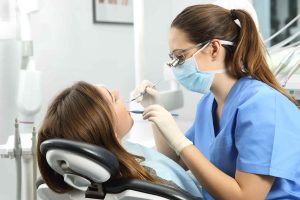What does the future of dental hygiene and therapy look like?
Lorna McGrath is the Northern Ireland regional group chair for the British Society of Dental Hygiene and Therapy (BSDHT). Here, she discusses the current situation for dental hygienists and dental therapists in Northern Ireland.
Just like on the mainland UK, dental hygienists and dental therapists in Northern Ireland are facing many challenges right now. The greatest concern is the availability, sustainability and high cost of enhanced PPE. This includes the FFP3 masks required for AGPs.
The majority of our work involves AGPs. They form a significant component of the periodontal care provided by dental hygienists and dental therapists through the use of ultrasonic instruments and technology such as airflow.
There are alternatives such as hand instrumentation, which – although effective – mean that treatment will take longer and may be more strenuous on the operator. Manual treatment also requires the careful management of patient expectations.
The increase in costs of enhanced PPE and the reduced patient flow through dental practices have made it unviable for some practices to currently offer a dental hygiene service. Many dental hygienists and dental therapists buy their own equipment to ensure the quality of brands. But if supply suffers and different PPE has to be purchased, the individual faces the higher costs of both new products and re-fit testing.
Substantial impact
Dental practices are further asked to look at the capability and capacity of their business. Many practices are rotating dentists between surgeries to comply with the one hour fallow time.
That means they may need the surgeries that would previously have been allocated to the dental hygienist or dental therapist, who ultimately now gets less time in practice. This can have a substantial impact on earning capacity. It is enhancing the anxiety individuals have about their future in the profession.
Finding a structure that works for dental hygienists and dental therapists in practice is key. There is still a lot of unmaintained periodontal disease in the population. As well as other problems that may have been exacerbated during lockdown.
For example, alcohol consumption, smoking and mental health. Dental hygienists and dental therapists have the ability to help patients manage all these issues and promote holistic self-care. It’s crucial that we find a way of optimising capabilities.
Support and collaboration
Some of the changes we need to see within the profession will likely need support from the government. I appreciate the enormity of the problems caused by the pandemic and the complexity of the situation for the Northern Ireland Assembly. But the lack of communication with our professional organisation at a local level during lockdown was disappointing.
However, the acting CDO for Northern Ireland, Mr Michael Donaldson, has since recognised our concerns and engaged with us. We hope to work together in order to address key areas within our profession moving forwards.
For the future, we need to improve and maintain access to dental hygiene and dental therapy for patients. There is a public-led demand. Our acting CDO has already started to take action with us on. We also need to look at the educational opportunities and structure for those wishing to become dental hygienists and dental therapists in Northern Ireland.
The course isn’t currently available here so we need to review different potential models of delivery that might suit the next generation. We need to support the future of dental hygiene and dental therapy in Northern Ireland.
Looking forward
Aside from changes in how we engage with the Northern Ireland Assembly and how practices are structured to promote dental hygiene and dental therapy, the role itself needs to adapt.
We are born oral health educators. Changing how patients in Northern Ireland perceive dental hygienists and dental therapists will be important for them to appreciate the full value of our services. Home care is key to disease prevention. Now is a perfect time to highlight the links between oral health and general health.
We also have a huge role to play in care homes, day centres and schools etc. post-COVID-19. We can address the oral health inequalities likely made worse by the economic downturn following the pandemic. This is especially important in Northern Ireland, where we have a high unemployment rate.
To help those patients anxious about visiting the practice, we should be using more technology to communicate with them. In fact, the opportunity for more digital dentistry and remote services is an exciting potential development for dental hygiene and dental therapy.
Optimistic
Effective skill mix utilisation within the dental practice is another possible part to the solution. We need to educate dental colleagues about the full scope of practice of a dental therapist, for example. We need dental nursing support for all clinicians and this includes dental hygienists and dental therapists.
While there is a lot to do, I am optimistic about the future of dental hygiene and dental therapy in Northern Ireland. There are many short and long-term opportunities for dental hygienists and dental therapists to utilise their skills and support the wellbeing of the nation.
We just need to support each other within the dental family. In the meantime, the BSDHT NI will continue working to keep members, as they say in my part of Belfast, ‘off the ropes’. I remain proud to be part of a professional organisation that has truly come to the fore in these difficult times.
Lorna McGrath is the Northern Ireland regional group chair for the British Society of Dental Hygiene and Therapy (BSDHT). She has been an active member of the Association since qualifying from Belfast School of Dental Hygiene in 1995.
She has held roles as chairperson and secretary for multiple tenures over the last 20 years. Her commitment is to the health and wellness of the dental hygiene and therapy community and the patients we serve.
For more information about the BSDHT, visit www.bsdht.org.uk, call 01788 575050 or email enquiries@bsdht.org.uk


